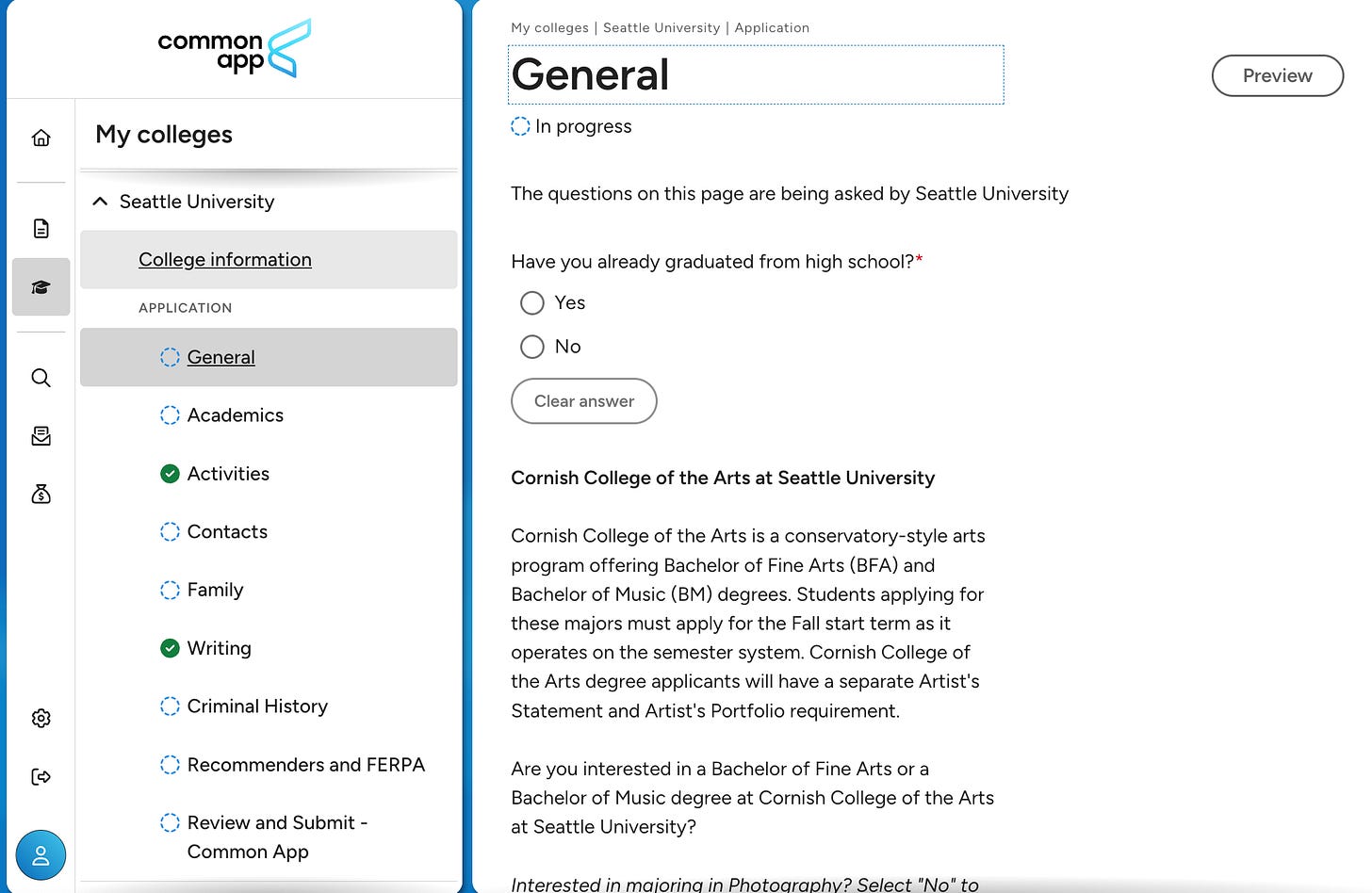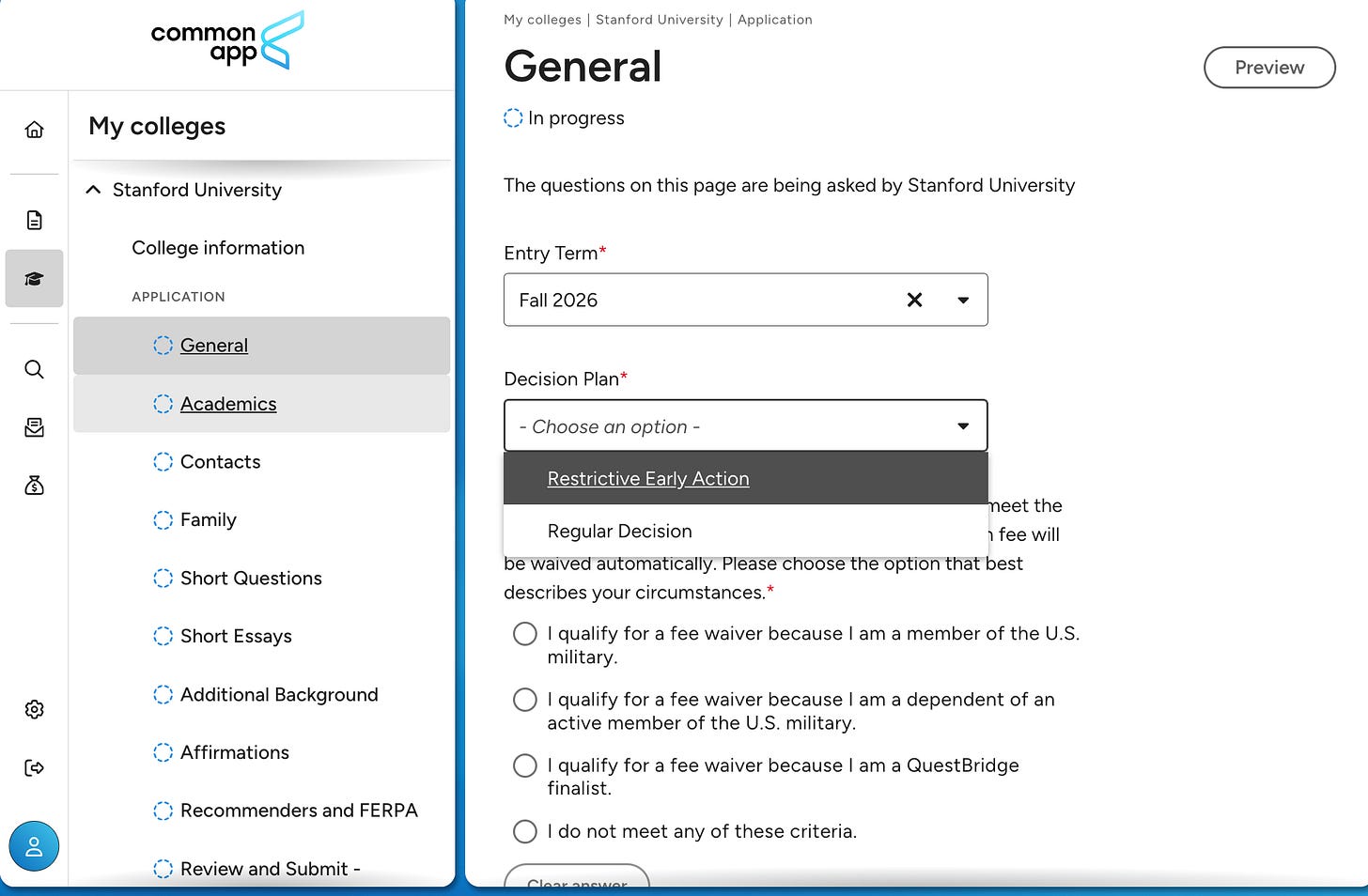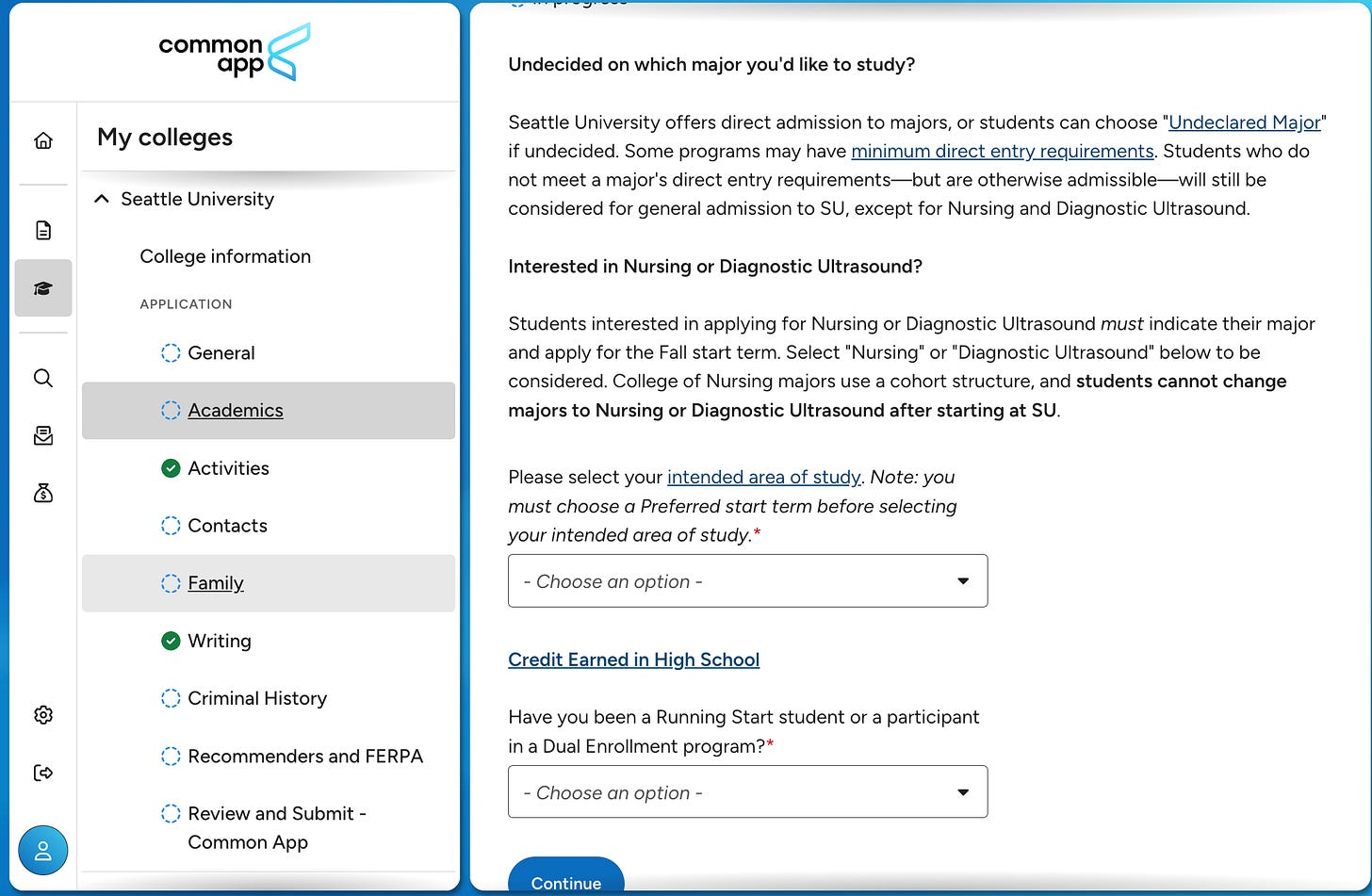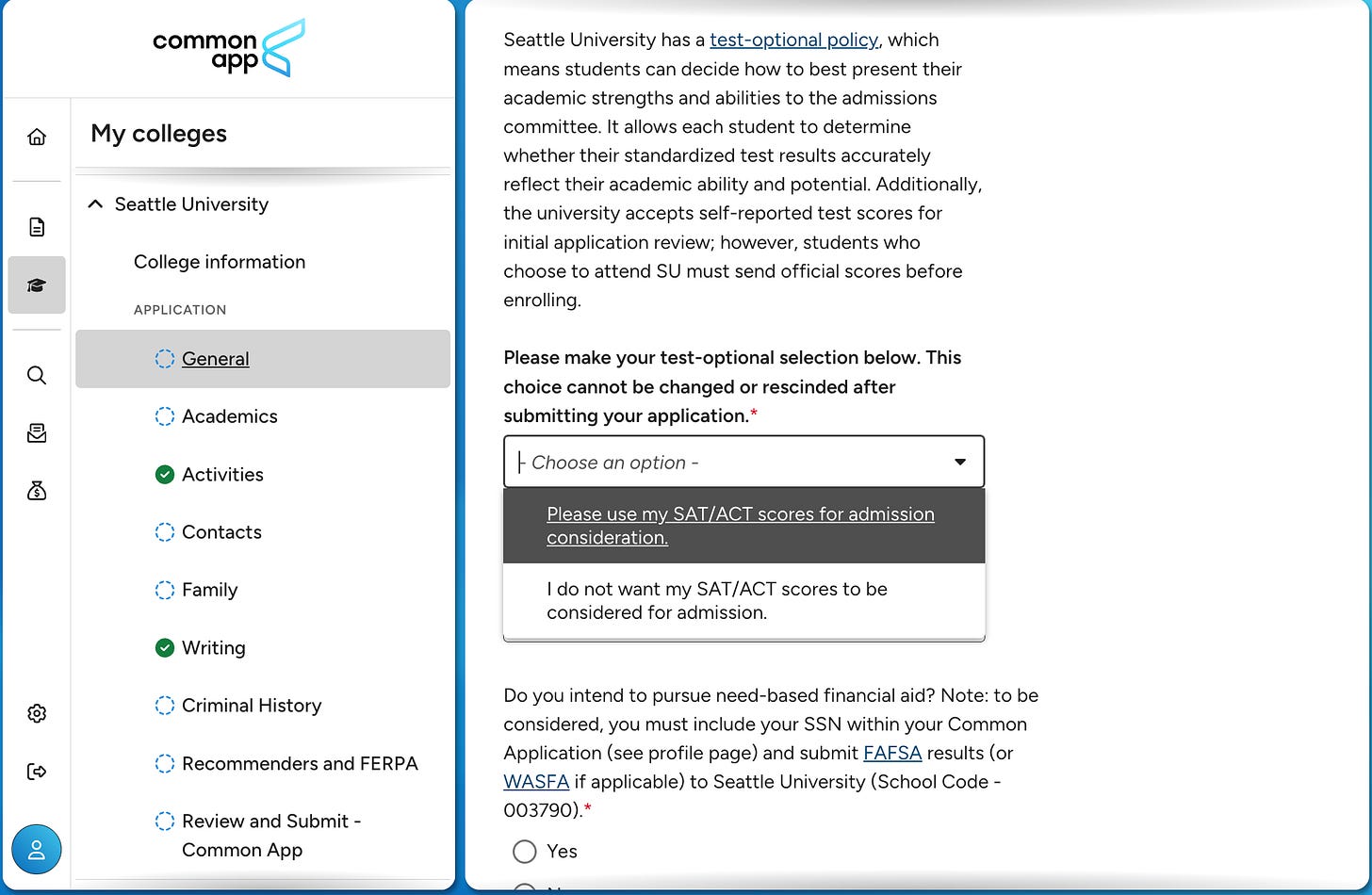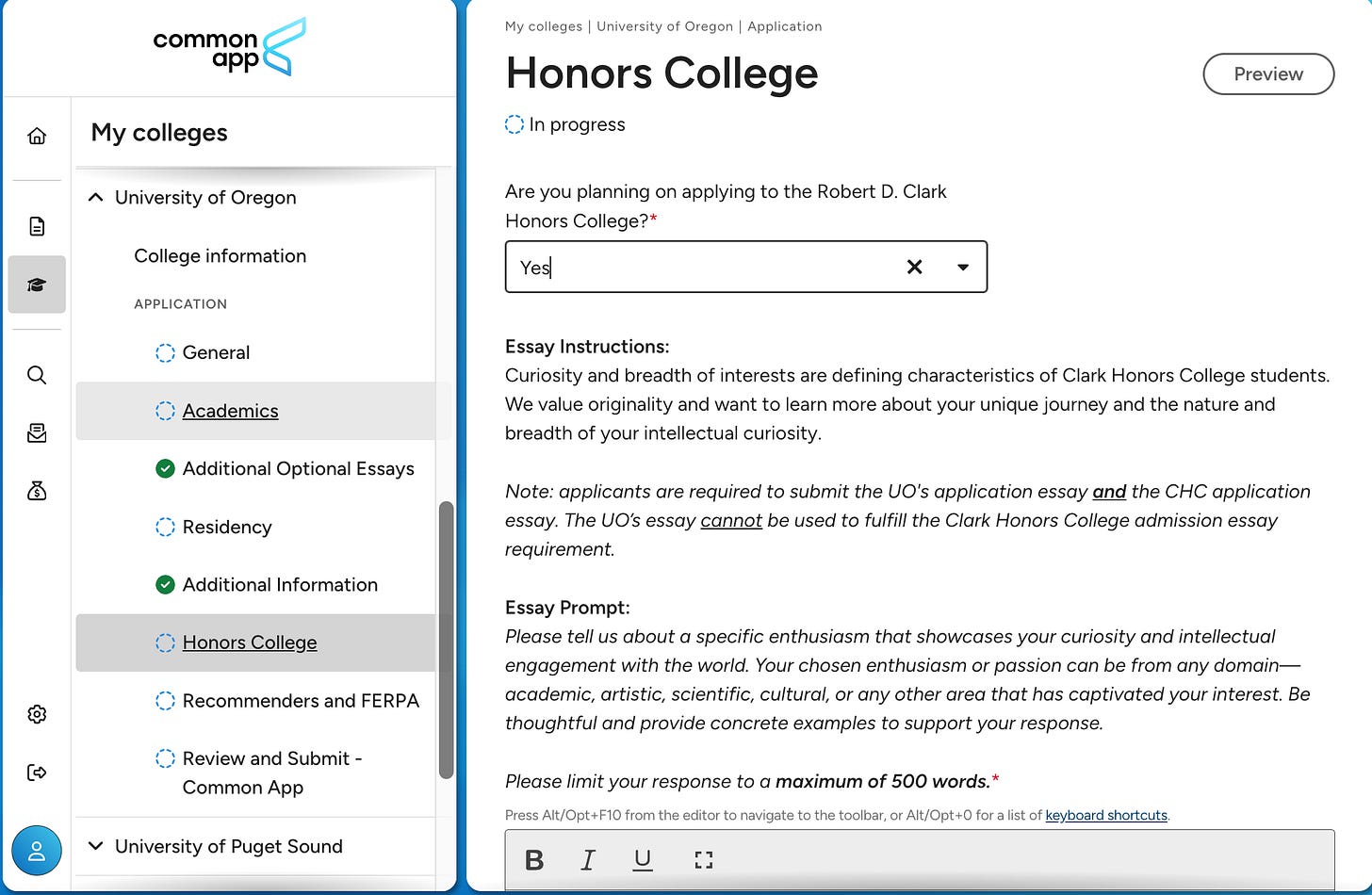Common App Section by Section - College Questions
Master the College Questions section of the Common App to tailor your application to each school.
College Questions
Our in-depth exploration of the Common App has covered the Profile, Family, Education, Testing, Activities, Essays (the personal statement), and Courses & Grades sections. Together, these sections make up the information that is sent to all colleges and universities to which you apply.
What about information intended for a specific college or university?
That’s where the “College Questions” section plays a role.
Each college or university you add to your ‘My Colleges’ list will have a set of unique questions you complete as part of your application to that school.
The colleges themselves write these questions, and they can cover everything from further details of your academic background to questions about state of residency (for in-state tuition purposes).
As an example, here are some of the questions you’ll find if you choose to apply to the University of Washington -
Preferred start term. (e.g. are you applying to start in the fall, spring, summer…?)
Indicate your first-choice major.
Are you a resident of Washington State?
Have you been in foster care in any system at any point after your thirteenth birthday, or have you experienced unaccompanied homelessness in Washington state in the past academic year?
I acknowledge that I want to apply for Interdisciplinary Honors, and I understand this involves a specific set of course requirements. Select below to access the required Honors essay prompt.
These questions can take various forms — sometimes multiple choice, sometimes short responses, and occasionally additional essays. And, because questions are unique to each school, there are too many to cover in depth here.
So instead of providing advice on how to answer every possible question you could encounter, let me give you a bit more information about the four most common questions you’ll likely see -
Admission plan (Early Decision, Early Action, Restricted Early Action, …)
First-choice major
Standardised testing plan
Honours program consideration
Admission Plan (Early Decision, Early Action, Restricted Early Action, …)
In the ‘General’ section of ‘College Questions’ you’ll often be asked to select an admission plan.
Regular Decision (RD): Traditional application plan; deadline is the final date to apply. Decisions come in mid-to-late March or early April.
Early Action (EA/EA I): Apply earlier, receive decision earlier. Non-binding; can apply to other schools and aren’t required to attend if accepted.
Early Action II (EA II): Same as EA but with a later deadline. Decisions come after EA I but before RD.
Restricted Early Action (REA)/Single Choice Early Action: Non-binding plan with limits on how many early applications you can submit. Check specific university rules. Consult with your counsellor before choosing.
Early Decision (ED): Binding agreement; must attend if accepted. Only one ED application is allowed, and all other applications must be withdrawn if accepted. Consult with your counsellor before choosing (and you and your counsellor typically have to sign and upload an agreement form).
Early Decision II (ED II): Same as ED but with later deadlines and decisions.
Rolling Admission: Applications are reviewed and decisions released continuously, sometimes daily, with no specific deadline. Can apply later in the year.
Is early admission right for you? See my previous post on the benefits and drawbacks.
First-Choice Major
All colleges want to know about your academic interests.
Some colleges and universities may make you choose, during your application, what major and field of study you will pursue. Others simply collect information to gauge overall interest in particular programs.
DO:
Research the specific major and schools you're interested in; check for any special admissions requirements.
Understand the rules for changing majors at each school (e.g., Georgia Tech allows only one unrestricted change).
It’s okay if you don’t know your major yet. Select subject areas that are most interesting to you at this time. Also, look at applying to schools that offer flexibility to explore different fields, especially small liberal arts colleges.
DON’T:
Don’t declare a less-competitive major in an attempt to game admissions. Schools may not factor major into admissions as much as you may think, and switching to your desired major later may be difficult. Instead, create a balanced college list with options for your major.
See my previous post on declaring a major in your college application, which also covers popular “direct admission” majors like computer science, nursing, and architecture.
Standardised Testing Plan
96% of colleges and universities are test-optional, meaning they allow students to choose whether to report SAT and ACT scores as part of their application.
If you choose not to report scores, you are not penalised - rather, testing information is simply not considered as a part of your application.
If you choose to submit SAT or ACT scores, most colleges and universities ask that you do so via an official score report. This means the organisations that administer the SAT or ACT send your scores directly to the schools you choose, for a small fee. See my previous post for more information.
You can also self-report your scores by entering them into the ‘Testing’ section of the Common App.
Helpfully, most colleges let you know directly in the Common App how they want to receive test scores - either an official report or self-reported.
Pro-tip: How to self-report scores to only some of your schools
If you want to submit self-reported test scores to some, but not all, of your colleges, then my recommendation is to approach this in stages. First, submit applications without test scores. Meaning, delete any test scores from the ‘Testing’ section of the Common App and submit applications to all schools where you’re applying test-optional. Then, re-input your scores into the Common App and submit those applications separately to avoid any confusion.
Honours Program Consideration
Last, many large public universities - and even some private colleges - offer additional academic, residential, and scholarship programs via an honours program or college.
List of colleges and universities with honours programs and colleges: https://www.nchchonors.org/home-map-information.
Some of the benefits of honours programs and colleges:
Smaller class sizes
Unique academic programs and opportunities, such as undergraduate research
Better on-campus housing facilities
Early class registration opportunities
There may be additional steps needed should you choose to apply to honours programs, e.g. you might be asked to write an additional essay, submit standardised test scores, or schedule and complete an interview.
Also note that most schools allow students to apply to honours programs at a later date (though programs are generally space limited, so it does usually help to apply earlier rather than later).
It is best to check with each university to understand honours program deadlines, as they are almost always different from the overall university application deadlines.




